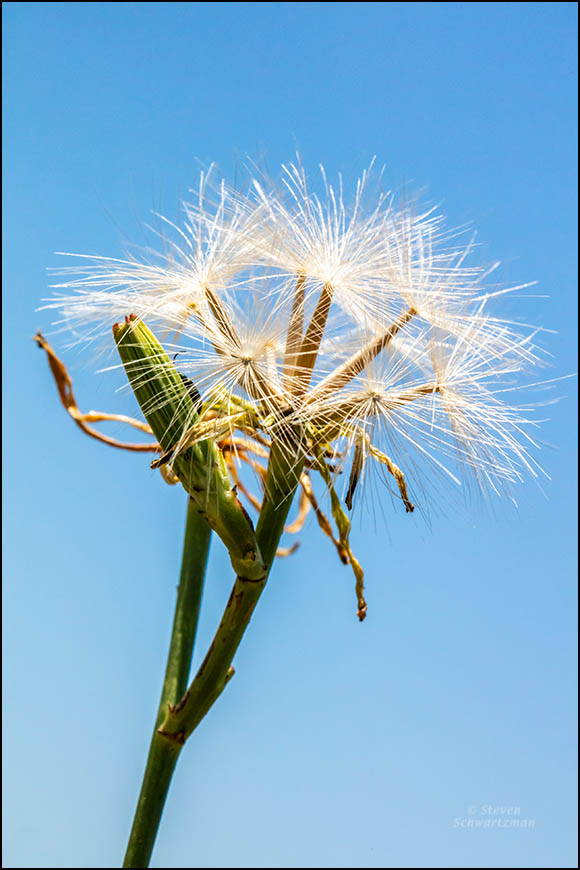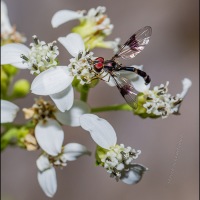Two takes on a skeleton plant
From July 10th along US 290 a few miles south of Johnson City come this backlit take on Lygodesmia texana, known as the Texas skeleton plant because its stalks are almost leafless. The flower head was whiter than usual and had one damaged ray floret. The view below shows you what a seed head in this species looks like.
The resemblance to chicory and the common dandelion confirms that the skeleton plant is a native relative of those two Eurasian species. All are in the Cichorieae “tribe” within the vast sunflower family (just as botanists belong to the cram-as-many-consecutive-vowels-into-a-scientific-term-as-you-can tribe).
§
§ § §
§
In contrast to the accusatory, non-equal-treatment indoctrination taking place in some American schools, as described yesterday, consider the fairness of the education guidelines the Florida legislature has enacted into state law. Regarding the teaching of African American history, for example:
- The Legislature acknowledges the fundamental truth that all persons are equal before the law and have inalienable rights. Accordingly, instruction and supporting materials on the topics enumerated in this section must be consistent with the following principles of individual freedom:
- No person is inherently racist, sexist, or oppressive, whether consciously or unconsciously, solely by virtue of his or her race or sex.
- No race is inherently superior to another race.
- No person should be discriminated against or receive adverse treatment solely or partly on the basis of race, color, national origin, religion, disability, or sex.
- Meritocracy or traits such as a hard work ethic are not racist but fundamental to the right to pursue happiness and be rewarded for industry.
- A person, by virtue of his or her race or sex, does not bear responsibility for actions committed in the past by other members of the same race or sex.
- A person should not be instructed that he or she must feel guilt, anguish, or other forms of psychological distress for actions, in which he or she played no part, committed in the past by other members of the same race or sex.
For years now there’s been a trope among some ideologues that certain deplorable Americans don’t want schools to teach about slavery. If there are any people who don’t want our schools to teach about slavery—and I’ve yet to have anyone point out a single example to me—the Florida legislature isn’t among them:
- The following is in the required [emphasis mine] instruction statute, s. 1003.42(2)(f), F.S.
- The history of the United States, including the period of discovery, early colonies, the War for Independence, the Civil War, the expansion of the United States to its present boundaries, the world wars, and the civil rights movement to the present. American history shall be viewed as factual, not as constructed, shall be viewed as knowable, teachable, and testable, and shall be defined as the creation of a new nation based largely on the universal principles stated in the Declaration of Independence.
- The following is in the required [emphasis mine] instruction statute, s. 1003.42(2)(h), F.S.
- The history of African Americans, including:
- the history of African peoples before the political conflicts that led to the development of slavery;
- the passage to America;
- the enslavement experience;
- abolition; and
- the history and contributions of Americans of the African diaspora to society.
- The history of African Americans, including:
“Ah,” some might say, “that sounds pretty general and might not mean much in practice.” Well, Florida has posted a document with grade-by-grade specifics. Pages 3–21 are about the African American experience, with pages 5–15 delving into slavery in great detail.
Nevertheless, and in spite of all this evidence, racialists are claiming that Florida’s African American history curriculum is a whitewash. For example, a few days ago I saw a partisan on MSNBC glibly say that the people in charge of education in Florida don’t want to teach about Rosa Parks. It so happens Rosa Parks is mentioned on page 4 of the above document. Either the partisan hadn’t done his research—in which case he shouldn’t have made the claim—or he was deliberately saying something untrue for political purposes.
The latest brouhaha arose over a single sentence among the many in the Florida standards: “Instruction includes how slaves developed skills which, in some instances, could be applied for their personal benefit.” Ideologues, including our country’s vice president, have taken that statement of historical fact and distorted it into the blanket claim that slavery was beneficial to slaves. On July 24th the Washington Free Beacon ran an article about this, the first two paragraphs of which are:
Vice President Kamala Harris’s claim that Florida’s new education standards whitewash slavery is “categorically false,” Florida Board of Education adviser William B. Allen said in an unaired ABC News interview.
Allen, a Michigan State University emeritus professor who is black, told ABC that the standards “never said that slavery was beneficial to Africans,” as Harris claimed. “What was said, and anyone who reads this will see this with clarity, [is that] Africans … were able to develop skills and aptitudes which served to their benefit, both while enslaved and after enslavement.”
You’re also welcome to watch a July 25th interview with Dr. Allen in which he explains in much more detail why the charges of a whitewash are a sham (and shameful, I would add). You can use the timeline at the bottom of the video to jump ahead to 3:20, where the segment begins; it ends at 21:35, and is therefore about 18 minutes long. One thing that endears Dr. Allen to language-loving me is his observation that even the grammar of the statement in question precludes the spin ideologues are trying to put on it.
© 2023 Steven Schwartzman












It has a pretty blossom and fun seed head.
circadianreflections
July 28, 2023 at 6:08 AM
It does and it does. The closest this species gets to Nevada is eastern New Mexico, so you’ll have to travel to get in on the fun.
Steve Schwartzman
July 28, 2023 at 6:18 AM
I laughed at your ‘cram-in-the-vowels’ reference. I came across a good one recently (Leontopodium leontopodioides), and just rolled my eyes.
Skeleton flowers are one of my favorites. Their seed heads can take on interesting, varied forms, and it’s always fun to see which insects are visiting. I’ve found caterpillars, skippers, beetles, and bees around them; they must be tasty.
shoreacres
July 29, 2023 at 7:09 AM
When I taught precalculus and dealt with a kind of curve called a cardioid, students often misspelled it cardiod. And no doubt you’ve noticed that many Texans share a feature of “Southern” English more generally, namely the simplification of two successive unstressed vowel sounds to one, as in the five-syllable Louisiana getting pronounced as the four-syllable Loozeeanna.
Steve Schwartzman
July 29, 2023 at 9:42 AM
It seems I don’t come across skeleton flowers as often as you do, given your familiarity with the kinds of critters that frequent them.
Steve Schwartzman
July 29, 2023 at 9:44 AM
Every year I’ve made it to the Comfort/Kerrville/Medina area when it’s their season, they seem to be everywhere. I think all of my photos have come from the roadsides around those towns.
shoreacres
July 29, 2023 at 9:52 AM
Ah, that accounts for it. Skeleton plants here aren’t uncommon but they’re not really common, either.
Steve Schwartzman
July 29, 2023 at 10:51 AM
LOL, I think botanists also have a ‘create the most unpronounceable name’ tribe, with a division that specialises in replacing perfectly good, well-known and easy-to-say names.
Ann Mackay
August 5, 2023 at 7:39 AM
I think you’re right. Maybe someday a daring journalist will do an exposé about the ISPC (International Scientific Pronunciation Cabal).
Steve Schwartzman
August 5, 2023 at 7:53 AM
Hehe!
Ann Mackay
August 5, 2023 at 10:55 AM